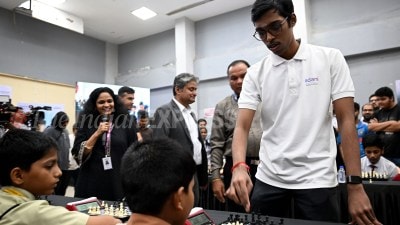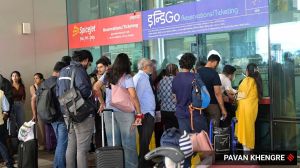Stay updated with the latest - Click here to follow us on Instagram
Sri Lankan President Wickremesinghe vows full implementation of 13A sans police powers
India has been pressing Sri Lanka to fully implement the 13th Amendment as the answer to the Tamil demand for political autonomy for the Northern and Eastern regions.
 Sri Lankan President Ranil Wickremesinghe. (File)
Sri Lankan President Ranil Wickremesinghe. (File) Sri Lankan President Ranil Wickremesinghe on Tuesday assured the Tamil parties that the contentious 13th Amendment will be fully implemented, without police powers, in the provincial councils.
Wickremesinghe met the Tamil parties ahead of his official visit to India starting on July 20, his first since becoming the president last year.
“The president outlined plans for devolution, stating that the 13th Amendment with full powers except for police powers as outlined under List 1 (the subjects reserved for provincial councils) will be implemented, including specified functions in List 3 in the provincial councils list subject to agreement among political parties in Parliament,” the president’s office said in a statement.
The List 3 entails provincial powers subjected to concurrence with the Centre.
The 13th Amendment, an outcome of an agreement reached between India and Sri Lanka after the Indo-Sri Lankan agreement of 1987, deals with the devolution of land and police powers to the provinces in Sri Lanka.
India has been pressing Sri Lanka to fully implement the 13th Amendment as the answer to the Tamil demand for political autonomy for the Northern and Eastern regions.
Sri Lanka has had a long history of failed negotiations to end the Tamil claim of discrimination by allowing some form of political autonomy.
An Indian effort in 1987 that created the system of a joint provincial council for the Tamil-dominated north and east faltered as the Tamils claimed it fell short of full autonomy.
Tamils say that not enough power had been devolved to the provincial councils to make them meaningful.
Wickremesinghe himself tried an aborted constitutional effort between 2015-19 which too came to be scuttled by the hardline majority politicians.
The Tamils put forward their demand for autonomy since gaining independence from Britain in 1948 which from the mid-70s turned into a bloody armed conflict.
Earlier, a press release from Wickremesinghe’s office said the president discussed the controversial Anti-Terrorism Bill with the Tamil parties.
He told them that the drafting committee will review the bill with the European Union’s concerns and the bill would be re-gazetted.
In March, the government brought the existing bill which came under widespread criticism, both locally and internationally.
The new bill was seen as even more draconian than the Prevention of Terrorism Act (PTA) enacted in 1979 and was believed could be used as a main tool to crush the armed separatist campaign of the LTTE.
The EU Parliament in 2021 adopted a resolution calling for PTA repealing – the action was linked to the continuation of the GSP+ trade concession for Sri Lankan exports.
The President’s office said that the Tamil parties were also informed of the setting up of an interim secretariat for the Truth Seeking Mechanism.
Since the end of the armed campaign, the setting up of a truth-seeking mechanism was being seen as a major reconciliatory action.
The Tamil parties were also told that the bill to set up the Office of National Unity and Reconciliation would be presented in Parliament shortly.
Over the years, the Sri Lankan government has been aggressive against Tamilian groups following its war with the Liberation Tigers of Tamil Eelam (LTTE).
The LTTE ran a military campaign for a separate Tamil homeland in the northern and eastern provinces of the island nation for nearly 30 years before its collapse in 2009 after the Sri Lankan Army killed its supreme leader Velupillai Prabhakaran.
According to Sri Lankan government figures, over 20,000 people are missing due to various conflicts including the three-decade brutal war with Lankan Tamils in the north and east which claimed at least 100,000 lives.
- 01
- 02
- 03
- 04
- 05































